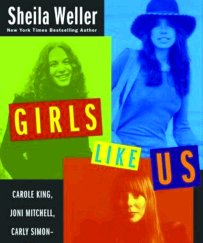LETTERS From CAMP Rehoboth
|
BOOKED Solid |
| A Review By Rebecca James |
 Girls Like Us: Carole King, Joni Mitchell, Carly SimonAnd the Journey of a GenerationSheila Weller (2008) Girls Like Us: Carole King, Joni Mitchell, Carly SimonAnd the Journey of a GenerationSheila Weller (2008)
They paved paradise And put up a parking lot With a pink hotel, a boutique And a swinging hot spot Don't it always seem to go That you don't know what you've got Till it's gone They paved paradiseAnd put up a parking lot I remember listening to my mom's albums as a kid. A product of the 50s and 60s, she had amassed a sizable collection of artists that included The Beatles, Carole King, and the folk rock singer songwriter whose lyrics appear above, Joni Mitchell. She showed me how to adjust her record player to accommodate the 45s almost as soon as I could walk and I would lie there for hours, letting the music wash over me. But I am a second generation fan. The early great female artists forever altered the expectations and aspirations of my mother's generation, and left my generation with options that felt like more than possibilities, more like guarantees. Just last month, the culmination of Sheila Weller's years of research into the lives of arguably the three most influential female artists was published; Girls Like Us is a dense, absorbing, and fact-filled narrative that intertwines the stories of Carole King, Joni Mitchell, and Carly Simon. Each woman's career was made when the stars aligned her talent with hard work, unbelievable ambition, and just the right amount of connections. Together, they made history. When woven together, the strands of their three separate lives, identities, and songs tell the rich composite story of women born middle-class in the early to middle 1940s and coming of age in the middle to late 1960s. Weller's words ring true; these women spoke to and for a generation. They coursed along the winding, glamorous, but, as Carole had put it, definitely "rutted" road of the prime of their lives. And in the processbecause, yes, songs are like tattoosthey would write, in music, a history of how that life really was, for them and so many girls like them. Weller's research into the general development of rock and roll music is especially helpful to understand the enormity of these women's words. Like most girls, they were raised to be the objects of songs, not the creators. As they began to explore how women felt about all sorts of taboo topics, people took notice. At the beginning of her career, Carole King and her then-partner sat down and together composed a song that reflected women's growing acceptance of their role in sex. Their blend of honest lyrics and strings "blew away" the Shirelles. Weller perfectly juxtaposes the moment of the song's release with that of the birth control pill: a song that reflected a concept so newa young single woman's declaration of herself as emotionally and sexually independent and responsible personthat it didn't have a name, was the song America was singing. That song was, "Will You Still Love Me Tomorrow?" The words tell us the singer is a cut-to-the-chase person, who, despite her vulnerability, possesses restraintshe's not demanding reassurance [...] It's "So tell me now," implying, I'll take it from here; the burden is now on me. Because it reflected them so effortlessly, Gerry says, 'We just thought it was another song.' Far from it. The song was groundbreaking, and it indirectly led to the birth of the woman who created the singer-songwriter genre, Joni Mitchell. One aspect of Weller's writing that makes the book so enjoyable is the way she intersperses tiny details about the women's lives that somehow capture the essence of their experiences. One night Joni looked up at the stars and began reciting poetry for [her friend]. 'It wasn't the coolest thing to do, back then and there [in their small town in Canada] to be writing or reciting poetry. But Joni looked at the sky, which on the prairie is so expansiveit goes on for miles. There's a sense that you can get out, that you can go anywhere. I viewed Joni as a tortured rebel; her drinking, a reaction to the fact that she was way too smart for this little-minded town she was in.' Mitchell's experiences as a young, single pregnant woman in the city, when coupled with her heritage of musically-inclined tortured souls, was no match for the music industry. She shined as bright as those prairie stars. Unlike these two rebels, Carly Simon was born into a family that already possessed a certain eccentric, yet sophisticated quality. In her twenties Carly would personify a fusion of traits and inclinationsclassiness with sexual voracity; almost soft-porn-like self-display and conscious motherhood; tidy privilege plus ragged longingthat had previously been thought dichotomous but which, during the sparks-flying juncture of second-wave feminism with the sexual revolution, were suddenly seen as powerful, real, and acceptable for middle-class women. Simon would carry the torch of the sensual, sexual, talented, and strong women for a generation. I really can't do Weller's work justice here. The biography reads like a narrative with multiple threads creating a cat's cradle of experiences that educates, entertains, and convincingly postulates the importance of these three lives. A few decades later still found their words touching another young girl, on the verge of her own independence. These are lives worth examining, and with Weller as a guide, readers will not be disappointed. Rebecca James divides her time between Pennsylvania where she teaches high school and completes her graduate studies and Delaware where she reads and relaxes. She may be reached at james.rebeccaa@gmail.com. |
|
LETTERS From CAMP Rehoboth, Vol. 18, No. 05 May 16, 2008 |
